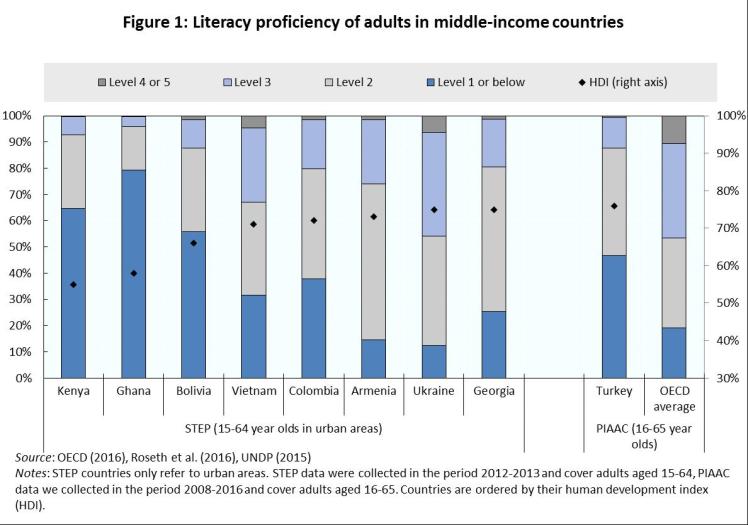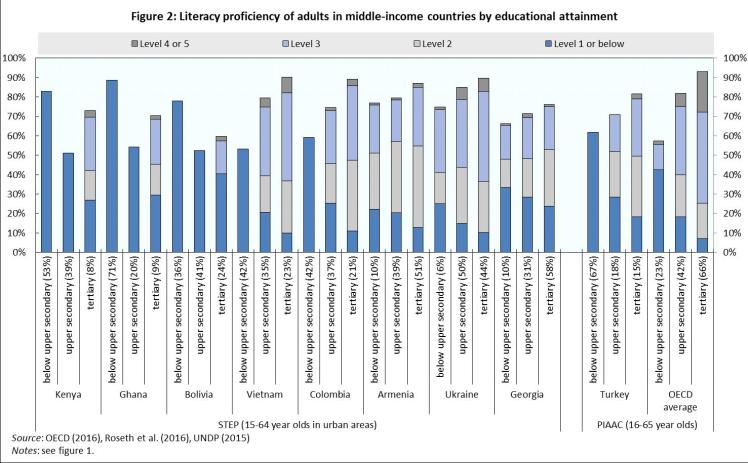Cognitive skills in middle-income countries: Evidence from PIAAC and STEP
[ad_1]
By Marieke Vandeweyer
The OECD Survey of Adult Skills (PIAAC), which measures cognitive skills of the adult population, has recently been expanded to include nine additional countries (see our earlier blog post “The survey of adult skills: Nine more countries added on”). As a result of this extension, the survey now covers 33 countries. The PIAAC survey is not the only survey that provides comparable information on cognitive skills. In 2010 the World Bank launched its STEP skills measurement programme for low- and middle-income countries. The information on literacy skills in the STEP survey is measured on the same scale as the PIAAC cognitive skills, making it possible to compare literacy skills across STEP and PIAAC countries. The countries covered by STEP are: Armenia, Bolivia, Colombia, Georgia, Ghana, Kenya, Ukraine and Vietnam.[i] The sample population in the STEP countries is restricted to urban areas, whereas in the majority of PIAAC countries the entire territory is covered. Consequently, the STEP results are likely to be higher than would have been obtained if both urban and rural zones had been covered.
Figure 1 shows the literacy skills distribution in middle-income countries (including Turkey for PIAAC), as well as the OECD average (for the OECD countries included in PIAAC). Countries are ranked by their Human Development Index (HDI) level. The figure clearly shows a substantial skills gap between middle-income countries and the OECD average. The exception is Ukraine, which haa a very similar skills profile as the OECD average. In Kenya, Ghana and Bolivia more than half of the adults have very low literacy levels (level 1 or below). This share reaches almost 80% in Ghana, while it is just below 20% in the OECD average. The share of adults with the highest literacy level (level 4 or 5) is negligible in most middle-income countries. The exception is again Ukraine, but also Vietnam which has almost 5% of adults in the highest level. The strong skills performance of Vietnam is even clearer when looking at students aged 15, as their average reading test score, measured in the PISA survey, is above the OECD average (OECD, 2014).

As one would expect, the literacy skill profile of the analysed countries is closely linked to their education levels. However, it is not just the level of education that matters, the quality of education also contributes to international differences in literacy proficiency. Figure 2 shows literacy proficiency levels by educational attainment for each country. The labels on the horizontal axis also show the proportion of the adult population at each educational attainment level. It is important to note that the differences between countries not only reflect differences in the quality of initial education, but also pick up other factors such as the degree (and quality of) of lifelong learning among the adult population. Differences in literacy skill levels for the individuals without upper secondary education also reflect differences in the composition of this group, with some countries having a large share of people with no education at all and others having a large share of lower-secondary educated individuals instead.
 While skill levels in literacy increase with educational attainment in all countries, those with the lowest level of development (measured by the HDI) still have a substantial share of very low skilled adults (level 1 or below) among the upper secondary educated and even among the tertiary educated. In Bolivia, for example, 52.5% of secondary educated adults and 40.4% of tertiary educated adults have the lowest skill level. Hence, while Bolivia has a higher share of tertiary educated adults than Ghana and Kenya, the Bolivian tertiary educated adults are on average less skilled. Strong differences also exist among countries with very similar educational attainment levels, such as Vietnam and Colombia. The share of adults with high literacy skill levels (level 3 or above) is higher in Vietnam than in Colombia for all educational attainment levels, resulting in a higher overall literacy skill level in Vietnam (see figure 1). Similarly, while Turkey and Ghana have comparable shares of the population with upper secondary and tertiary education, skill levels in literacy among these individuals are much higher in Turkey.
While skill levels in literacy increase with educational attainment in all countries, those with the lowest level of development (measured by the HDI) still have a substantial share of very low skilled adults (level 1 or below) among the upper secondary educated and even among the tertiary educated. In Bolivia, for example, 52.5% of secondary educated adults and 40.4% of tertiary educated adults have the lowest skill level. Hence, while Bolivia has a higher share of tertiary educated adults than Ghana and Kenya, the Bolivian tertiary educated adults are on average less skilled. Strong differences also exist among countries with very similar educational attainment levels, such as Vietnam and Colombia. The share of adults with high literacy skill levels (level 3 or above) is higher in Vietnam than in Colombia for all educational attainment levels, resulting in a higher overall literacy skill level in Vietnam (see figure 1). Similarly, while Turkey and Ghana have comparable shares of the population with upper secondary and tertiary education, skill levels in literacy among these individuals are much higher in Turkey.
Overall, the data confirm that a big skills gap in literacy remains between some middle-income countries and the OECD countries, especially for those that rank lower on the HDI. For these countries to increase their skill level in literacy, it is important to raise educational attainment, but also to improve educational quality. As noted by Hanushek and Woesmann (2008), in order to develop cognitive skills, developing countries should move away from a sole focus on school enrolment rates and years of schooling towards policies for improving school quality. Furthermore, in order for the skills acquired in education not to atrophy, policies for lifelong learning should be promoted. Cognitive skills are not only positively associated with individual well-being and labour market outcomes, but also contribute to economic growth (OECD, 2016; Hanushek and Woessmann, 2008).
References:
UNDP (2015) Human Development Report 2015: Work for Human Development, United Nations, New York.
[i] STEP survey data are also available for China (Yunnan province), Lao PDR, Macedonia FYR and Sri Lanka, but comparable information on literacy skills is not collected.
[ad_2]


